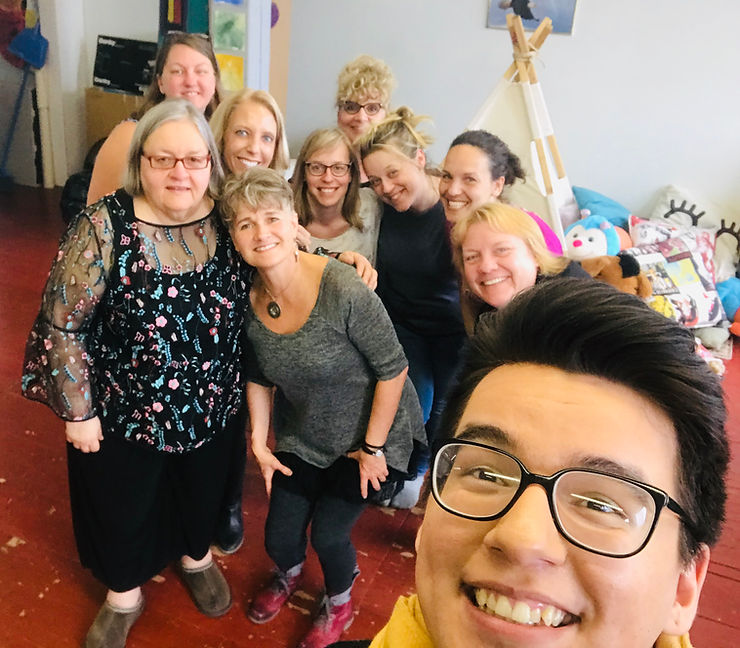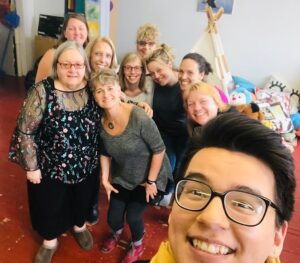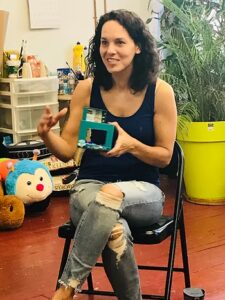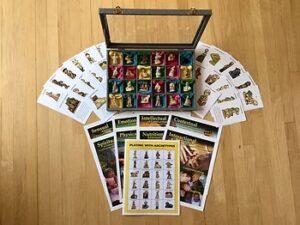
Artist & Educator: Two Perspectives on the Expressive Arts Certificate

Expressive Arts Class
With different life experiences come different perspectives. I had the pleasure to speak to two former WHEAT students about their experiences in the Expressive Arts Certificate – one a lifelong artist and the other a lifelong educator.
Working in Student Services at the elementary level, Shannon Cyr entered the program with hopes to connect to children who had difficulties connecting. She hoped to obtain skills and tools to make a difference in the lives of her students.

As a lifelong artist and writer, Janine Tougas came into the program hoping to allow herself to play. She wanted to take risks and pursue creative self-growth.

This is what they had to say about their experiences in the WHEAT Expressive Arts Certificate Program.
Question: Why did you decide to take the Certificate?
Shannon: I met Darci, the founder of WHEAT, during my Post- Baccalaureate program at the University of Winnipeg. I then learned about WHEAT Expressive Arts Certificate during a professional development day years later. At this time, I had completed my Post-Bac and a Masters degree, along with a multitude of professional development, but I still felt like there was a missing piece in my work.
I had noticed an increasing number of students were struggling with emotional regulation at school. As educators we know that children are not able to engage in learning successfully when they are worried, stressed and dysregulated. These students often struggle to explain what they need or are experiencing through words. I was seeking a different approach to help them connect to their own emotions and experiences and develop self-regulation and advocacy.
I do not consider myself an artist, so I was nervous in the beginning of my learning with WHEAT. However, it quickly became evident that, although many of my classmates as well as many students I support are talented artists, the power of healing is in the process of the experience not the end product. One does not need to have artistic talents to support students through these modalities, they need knowledge of the methodology to facilitate impactful, trauma informed, opportunities and connections for wellness.
Janine: In 2017 I attended the IEATA conference, Indigenous Roots of Expressive Arts, which was hosted by the WHEAT Institute in Winnipeg. There were people from all over the world and I could really see the impact of all the incredible people, willing to devote their talents, yearning and energy to self-growth. It totally convinced me that this was my community. And it wasn’t just a small local community either, it was a global community.
This experience convinced me to take the Expressive Arts Certificate at WHEAT in 2018.
Question: What was your experience in the Certificate like?
Shannon: The instructors created a great balance between sharing knowledge and integrating experiential learning. Throughout the program I gained knowledge and theories but beyond that I left with experiences and an understanding of approaches to use in the classroom.
To truly learn, I had to take risks and be brave myself, just like I ask my students to do every day. The program enabled this by creating a safe space for us to take risks to process and learn. We set group expectations and rules so that the environment was conducive to everyone’s learning.
I found that I often came in at the beginning of the day with a lot on my mind, but I got so immersed in the learning that the time flew by and I left with a feeling of renewal, possibilities, and inspiration.
Janine: I came into the program hoping that I would be allowing myself to play. I wanted to take risks; and I did, every single weekend. I felt like a little kid about to go to a camp that they really wanted to go to every single weekend.
The experience was so rich. It was like being planted in the most amazing garden and being allowed to explore, play, enjoy my own expression and creativity while reveling in others expression and creativity. It felt like true connection to both myself and others.
The word “holistic” is in the name WHEAT – Winnipeg Holistic Expressive Art Therapy Institute – and that is how I would describe my experience. Attention to my physical needs, emotional expression, intellectual and mental learning were all present in my journey, along with the spiritual and interactional pieces.
One of my really good friends passed during the program. It felt like the greatest gift I could have received to be able to enter those weekends and be who I was. I didn’t have to pretend to be alright, I didn’t have to put my feelings on a shelf, I could really just be there. It gave me a whole new perspective on how I could be in the world. Sometimes it can be very hard to just be yourself in regular curricular courses. But in this program the instructors walked their talk and created a safe space to feel.
Question: How did learnings from the Certificate translate into the real world?
Shannon: The program completely realigned what I do every day. My go-to strategies are very different now. I don’t start by talking to the students from cognitive behavioural perspective; I’ve continued to start by holding space for them and accepting the state they are in. The first thing is just to be with them. I don’t ask what happened, I wait for them to be ready to share. More than anything, kids need a space to come and reconnect to themselves and feel heard.
Using Expressive Arts interventions, students are able to attain a calm regulated state as well and begin to process their own understanding of an experience, which then leads to a student-centered solution focussed outcome. The outcome impacts their social emotional growth and healing, feelings of safety and support at school, and academic learning.
Janine: It’s been so integrated into my life. It’s changed me as a writer, changed the way I see the world, and changed the tools I can offer to anyone who reads my work.
On a personal level, during the course I started to draw a Mandala every day and found this practice to be a wonderful outlet for releasing stress and to “take my spiritual pulse” in a deeply gratifying manner. This is an ongoing ritual that I am still doing three years later.
Question: How has the certificate been a part of your life since graduation?
Shannon: One thing that I appreciated about my experience is that after every course, I was able to go back and try the technique in the school setting. Now, I’m able to contribute directly to this aspect of the program, as I’ve been asked to participate in teaching the Practicum Skills course of the certificate program, which counts as the Practicum Skills class at the University of Winnipeg in the Post Baccalaureate Diploma in the Faculty of Education. I will be sharing how I use Expressive Arts in the classroom and facilitating activities for children for are struggling.
Janine: I created a therapeutic game during the Certificate called Playing with Archetypes. It might’ve just ended there, except one of my fellow students pulled me aside and said that she hoped I was planning on putting these together so she could buy one.

I started making the Playing with Archetypes game, with all proceeds going towards two scholarships at WHEAT Institute, because I truly believed in the power of the arts.
My father passed away in 1999 and he was not someone who was very openly generous with his money, but what he said a couple days before he died was that he believed that money was to help people do what they came to do on this earth. If someone feels that what they came to do was to help themselves and help other people through the arts, then my money should be used to help them do what they came here to do.
So far, 120 Playing with Archetypes games have been created, and they have helped to raise $10,000 for WHEAT Institute scholarships.

Vintage Porcelain Red Rose Tea Figurines
Each set includes 24 vintage porcelain Red Rose tea figurines (shown in the image), that represent nursery rhymes and fairly tales. These were premiums in Red Rose Tea boxes from 1972 to 1979. It also includes 24 cards with written rhymes or shortened fairly tales and questions on the back to explore the archetypes message. 8 mini posters of universal resources described by eminent family therapist Virginia Satir and a 16-page booklet describing 10 game activities inspired by Satir’s therapeutic model are also included.
Learn more about Playing with Archetypes.
Question: What would you say to someone considering the certificate?
Shannon: I have had a lot of conversations encouraging my colleagues to sign up because the learnings have been so impactful every day in what I do. I have also had colleagues noticing what I am doing to support students and asking to learn more, or to co-facilitate an experience for their classroom.
This program is versatile and there are many roles that could benefit. Anyone in a Student Services, Counsellor or community support role would certainly be a good fit, but the benefits go beyond one-on-one work.
Within my role, I’ve been able to facilitate small group, individual and whole class experiences. Although the program is focused on health and wellness, there are ways materials can be worked into the classroom curriculum as well, for example through journal writing, art elements, or design process.
I would encourage educators not to be scared off by the word “therapy”. Naturally, in education, we are in a nurturing role. We all support student wellness and emotional safety and growth, regardless of our role in schools. Expressive Arts Therapeutic interventions offer supports accessible to all students and can naturally occur in a the class setting. Since we are supporting our students anyway, we might as well be the best supports that we can be.
I am thankful to WHEAT Institute for giving me new knowledge and tools, so that when I leave work for the day, I truly feel that I’ve made a difference.
Janine: When I speak to others about the Certificate, I tell them whatever it is you would like to do or whatever contribution you would like to make as a teacher or an artist, you can do this through the certificate. Create your intention before going in and tailor-make what it is that you want to improve in yourself, so that as you go, you get to apply what it is you’re learning.
Interested in the Certificate? Explore the Expressive Arts Certificate, in detail.
Program begins November 28th. Register now at info@wheatinstitute.com.
